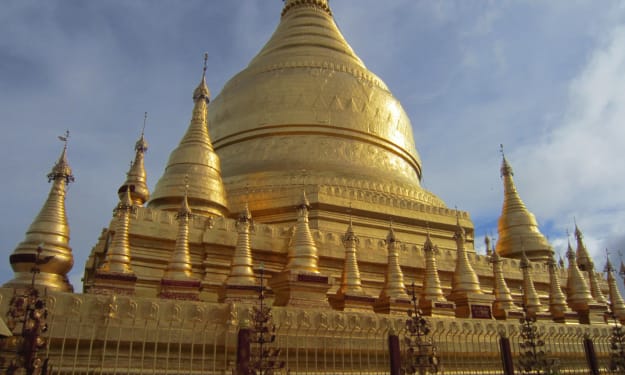Confessions of Someone Who Isn't Black
The news these days is pretty grim.

I wrote this essay back in July of 2016 when week after week, we would see more and more brutality from the police against unarmed black men and women. In light of the events in Charleston, I felt it important to share this with the world again.
The news these days is pretty grim. It seems that every week or so, we see the broadcasts that yet another unarmed black American has been killed by the police. Men, woman, children — It doesn’t seem to matter. In the last week, we’ve seen two more individuals killed. It is almost as if we are stuck in some kind of time loop; unable to break free and forced to watch the same moment over and over again.
The one thing we want to see after events like this happen is change. However, in the hours that follow events such as these, we always have to endure the same circus that reveal media figures, politicians, and the everyday politically minded Facebook friend sounding off to anyone that will listen. Some fight for the change we need while others just fight. Some look to lift us out of this hole and some look to lift themselves to a higher place in their field. The one place where we need to see change and don’t is in the lives of black Americans.
I’ve realized something over the course of the past few months and it’s something I feel the need to confess — I have no idea what it feels like to be Black and it would seem that if you’re not Black, you never will. As a gay man, I used to think that I knew. I had experienced discrimination from people on the streets and in my family. I had to march in the streets for the right to get married and for equal protection under the law — I thought that being a part of a minority gave me some insight into what other minorities felt. Turns out I was wrong. Dead wrong.
What am I missing? What is it that makes my gay minority so different from the Black minority? The answer is that I don’t wear my minority on my skin — people can’t see it. The other thing I’m missing is something that is embedded deep in the heart and soul of every Black American, and that is fear. Black Americans feel something that other races don’t and that is a genuine fear — A fear for their lives. A fear for their lives from those that protect us and situations that serve to keep us safe. When I walk past a group of police officers on the street or approach a random stop and frisk table in a New York City subway station, I have never once feared for my life. I don’t have a fear that I’ll be stopped and if I am, I don’t have a fear that I’ll have to stand up for myself and for my innocence and if I do, I don’t have a fear that I’ll lose and if I do, I don’t have to fear that I could be killed or someone I love could be killed. The reason behind all of this is plain and simple — it’s because I don’t know what it’s like to be Black.
As I can see, it would appear that the police are always having to keep us safe from the “bad guys.” Every hero needs a villain, right? But who are these bad guys? Who do we cast as our villains? And at what cost? Why is it that every Black American is seen immediately as some kind of villain? As the person that has a weapon on them or drugs in their pocket? Why is it assumed that they are guilty until proven innocent? Isn’t it supposed to be the other way around?
I have heard it said by figures in the media and in politics that the police treat White criminals the same as they treat Black criminals, and that may be true — But what about that period of time before it’s known that they’re a criminal? White criminals go through a process of being proven that they’re a criminal before they’re treated like one. Black criminals are, more often than not, seen as criminals before they even step in the door and that, to me, is a horrendous crime. InnocentWhite people are treated like innocent White people but innocent Black people are treated like guilty Black people. Why? Is it because generations of Black people plagued the community with stereotypes of drugs and violence? I’m Italian and my ancestors have generations of experience with drugs and violent crimes... Why is it not assumed that I could have a weapon in my bag or drugs in my pocket? I have a feeling that it’s because Italians can blend in the quintessential innocent demographic — the privileged White man.
Freedom and safety have their cost, this we know. But I have to say that if my safety and my freedom come at such a great cost as to allow my fellow Americans of color to feel like they are the villains in the lives of everyone else, then I have another confession to make — I don’t want those freedoms. The real cost here is that we are all being turned against each other. Black against White. Us against the police.
I just have so many questions. My mind is an unending array of questions — Why do unarmed Black Americans have to die? Why is the only way to stop them — to get them down and have them stay down — Why is the only way to do that with guns or groups of six cops against one? And why the need to stop them? Stop them from what? I feel that Black people (like every other American) have the right to stand up for themselves, to question respectfully, and to protect their innocence and I think the strength and confidence needed to do that turns the tables. To be blunt, it scares the shit out of people. It gives the police and the rest of the “privileged White people” in this country something to fear as well. Yes, I believe the key factor in all of this racially fueled violence and these struggles of oppression is fear.
If I was to try and summarize the path of fear in this situation, it would probably sound something like this — The police fear Black people because they don’t put up with their racist bullshit of assuming that every Black person is a criminal. Black people fear the police because the police have guns, weapons, and other means of inflicting pain, suffering, and obedience. Black people also fear the police because it would appear that they are not held accountable for their actions and bad cops are often allowed to blend in with the good ones. People that aren’t Black fear people that are because they don’t understand them. I also believe that White people with power fear most losing their power. Black people with no power fear that they will never have power. All of these things keep us in a constant battle with what we fear and what we don’t know and that is allowed to rule our decision making and our politics and our ideas of what is wrong and what is right.
I have two confessions to make — I don’t fear the police and at the same time, I don’t fear Black people. The events of today's racial violence or police killings? I stand in the middle in that place where I don’t fear either side. Should I? Should I fear the police? I don’t think so. Fearing something gives it power and I don’t think the police need anymore power. They have to figure out how to get the job done with their allotted resources.
I think it’s important to use the power we have wisely. There is power in knowledge and that power should be used in voice and in action. We always have a voice and we should always use it. I’m going to use mine to encourage people to not be ruled by their fears and to not allow things they don’t understand to turn into things that terrify them. I’d like to think that I can make a difference and I’ll have to continue to hope that I can.
In the fight against fear, you can’t lose your ability to hope for the better.
About the Creator
Michael LaMasa
10+ years in New York. Dorothy in "That Golden Girls Show" Off-Broadway. Political and comedy writing published on HuffPost. Stage writing and collaborative projects produced at LaMaMa NYC, NYMF, and Arizona Broadway Theatre in Phoenix, AZ.






Comments
There are no comments for this story
Be the first to respond and start the conversation.